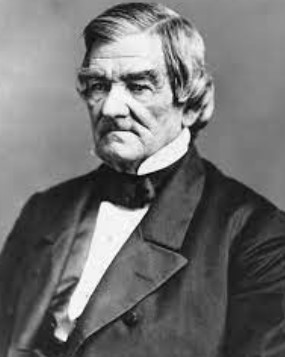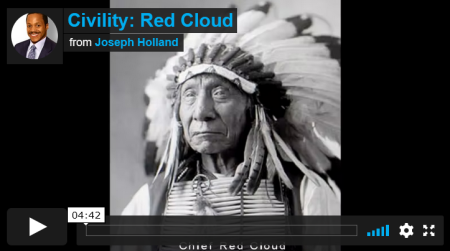John Ross
WORD OF THE DAY
PERSONAL CONTEXT
HISTORICAL CONTEXT
SUCCESS PRINCIPLE
CIVICS LESSON
Click below to listen to audio:
PERSEVERE THROUGH SUFFERING
If we had but one square mile left, they would not be satisfied unless they could get it.
John Ross
John Ross, who was also known by his Cherokee name “Guwisguwi”, served as the Principal Chief of the Cherokee Nation for almost forty years beginning in 1828, a longer tenure than any other leader. Rising from his humble beginnings of his Tennessee childhood, Ross rose to lead his tribe through the most tumultuous period of its history — the relocation from the Southeast to the Oklahoma Territory in the late 1830’s.
Before his tribal leadership Ross was a successful businessman, first as a tobacco farmer, then, through his founding of Ross’s Landing In 1816, as a tradesman. In 1817 Ross was elected to the Cherokee National Council and was charged with negotiating with government officials concerning the Cherokee land that these officials wanted the tribe to trade for property west of the Mississippi River. Ross led the ongoing resistance to ceding any of the tribal lands, but this conflict escalated with the federal passage of the Indian Removal Act in 1830. Consequently, President Andrew Jackson encouraged the tribes of the Southeast — the Chickasaw, Choctaw, Creek as well as the Cherokee — to relocate. Ross and the Cherokees were the only tribe to refuse to sign treaties accepting removal from their homelands.
To defend Cherokee rights, Ross initiated legal action. “Cherokee Nation v. Georgia” was argued before the United States Supreme Court. Even though Chief Justice John Marshall ruled that the Cherokees were a sovereign nation, the court held that it didn’t have original jurisdiction over a case in which a tribe was a party. In 1836 Ross sent a letter to “the Senate and House of Representatives”, in which he stated:
We are stripped of every attribute of freedom and eligibility for legal self-defence. Our property may be plundered before our eyes; violence may be committed on our persons; even our lives may be taken away, and there is none to regard our complaints. We are denationalized; we are disfranchised.
Despite Ross’ heroic efforts, a treaty signed by only a small fraction of Cherokee tribal members was authorized by one vote in the U.S. Senate, and federal troops were sent to Georgia to forcibly displace the Cherokees from the Southeast. Ross led his tribe on this westward journey of great suffering which came to be known as the “Trail of Tears.” Once the tribe was settled in the Oklahoma Territory, he supervised the writing of the new constitution and was elected chief of the new government, a position he held for the rest of his life.
Ross persevered through suffering, providing leadership for his people through excruciating times. No matter how difficult your moment, you can make it through as you:
REACH FOR INNER STRENGTH
You are stronger than you think you are. Retreat: step back from the battlefield. Reflect: meditate on the fact you’re still here . . . on the tribulations you’ve already made it through. Recharge: you did it before; you can do it again. Staying internally focused will help you
RESIST THE OPPOSING FORCES
Like Ross, don’t give in to the opposition. Keep fighting the good fight. Losses may come. If you don’t give up, the your victories will be greater than your defeats. Make sure to join with allies so you can
RIDE THE MOMENTUM OF SUPPORT
Ross was able to garner lots of support in Congress, just not quite enough. Gaining greater support will mitigate the burden of suffering. One of the keys to your perseverance will be to
REALIZE THE POWER OF UNITY
Be a leader through your suffering. Commune with others who are also experiencing tough times. Such unity will add strength as you hold each other accountable to do your best!
KEY POINTS
WORD OF THE DAY
Tumultuous — full of confusion, change, or uncertainty; very loud.
PERSONAL CONTEXT
John Ross was born in 1790 of mixed parentage: a Cherokee mother and a Scottish father. Raised near Lookout Mountain near present-day Tennessee, Ross grew up bilingual and bicultural among other mixed-race Cherokee young people, learning about both his Cherokee heritage and colonial British culture.
HISTORICAL CONTEXT
Because he was fluent in the English language, Ross was selected to travel as part of a Cherokee delegation to Washington, D.C., in 1816. In his mid-twenties and the youngest delegate, Ross was the principal negotiator on issues such as tribal boundaries, white encroachment and forced Native American relocation. Ross so distinguished himself that it was not long before he was elected president of the National Cherokee Council, which launched his half-century of various positions of Cherokee tribal leadership.
SUCCESS PRINCIPLE
See Success Principle Worksheet
CIVICS LESSON
See Civics Lesson Worksheet


